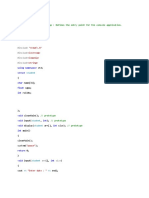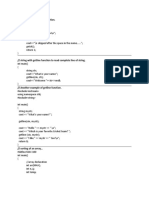0% found this document useful (0 votes)
31 views11 pagesSodapdf
The document contains multiple C++ code snippets demonstrating various programming concepts such as classes, constructors, friend functions, and different types of function calls (call by value, call by reference, call by address). Each snippet illustrates a specific feature, including the use of static members, inline functions, and dynamic memory management. Overall, the document serves as a practical guide to understanding object-oriented programming in C++.
Uploaded by
srikanth.btech2024Copyright
© © All Rights Reserved
We take content rights seriously. If you suspect this is your content, claim it here.
Available Formats
Download as PDF, TXT or read online on Scribd
0% found this document useful (0 votes)
31 views11 pagesSodapdf
The document contains multiple C++ code snippets demonstrating various programming concepts such as classes, constructors, friend functions, and different types of function calls (call by value, call by reference, call by address). Each snippet illustrates a specific feature, including the use of static members, inline functions, and dynamic memory management. Overall, the document serves as a practical guide to understanding object-oriented programming in C++.
Uploaded by
srikanth.btech2024Copyright
© © All Rights Reserved
We take content rights seriously. If you suspect this is your content, claim it here.
Available Formats
Download as PDF, TXT or read online on Scribd
/ 11
























































































